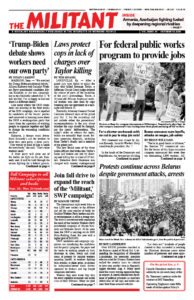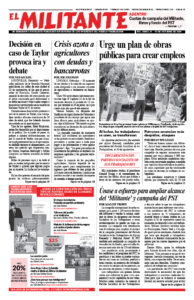LOUISVILLE, Ky. — After a grand jury here failed to indict the cops who killed Breonna Taylor, a Jefferson Circuit Court judge ordered the release of parts of the recording of the jury’s proceedings. Taylor, a 26-year-old African American medical worker, was shot dead by cops breaking into her apartment in a midnight raid March 13.
Kentucky Attorney General Daniel Cameron released tapes of the grand jury Oct. 2, but the recordings did not include either the prosecutors’ recommendations to the jury about whether the cops should be charged, nor the jurors’ deliberations. The judge’s order to release the tapes, which are normally kept secret, follows numerous demands, including from Taylor’s family and a member of the grand jury.
The jury found none of the three police officers that broke into Taylor’s home had broken any law by shooting and killing her in a hail of 32 bullets. Detective Brett Hankison was charged with wanton endangerment for shooting wildly into a neighboring apartment.
At a press conference after the jury’s decision was announced, Cameron justified the decision not to press charges related to Taylor’s killing, stating that “according to Kentucky law, the use of force by [Sgt. Jonathan] Mattingly and [Detective Myles] Cosgrove was justified to protect themselves.”
Such laws, which exist all across the country, are designed to ensure cops are shielded from prosecution at all costs. Kenneth Walker, Taylor’s boyfriend, had fired a single shot at the cops when they busted into the apartment, fearing that he and Taylor were in danger. He wounded Mattingly. Hankison, Mattingly and Cosgrove then blindly opened fire, killing Taylor.
“Cameron did not serve as an unbiased prosecutor in this case,” wrote the Taylor family’s lawyers in a letter published after the jury’s decision. He “intentionally did not present charges to the grand jury that would have pursued justice for Ms. Taylor.” The family is urging the case be reopened.
One of the jurors has filed a lawsuit seeking permission to speak freely about the jury’s deliberations, saying Cameron used jurors “as a shield to deflect accountability and responsibility” for the decision not to indict any of the officers. The juror’s lawsuit will be heard Oct. 8.
The grand jury heard taped interviews from the three officers involved in the raid, Walker, testimony from an investigator for the Attorney General’s Office and other witnesses.
Its recordings show cops telling investigators that they had knocked on Taylor’s apartment door for between 30 to 90 seconds before breaking in. One neighbor told authorities he heard the police announce themselves, but several others say they only heard the pounding on the door.
After shooting Taylor, the officers said they concerned themselves with arresting Walker and taking Mattingly to the hospital. The three cops never attended to Taylor, who bled to death. Charges against Walker were later dropped.
Detective Joshua Jaynes had obtained the search warrant used by cops in the deadly raid by claiming that packages of drugs were delivered to Taylor’s apartment for her ex-boyfriend Jamarcus Glover. Taylor’s family says the warrant was obtained dishonestly. The grand jury recordings show jurors asking whether the cops who carried out the raid had been told that other officers had already located Glover elsewhere before Taylor was killed. No answer is found on the tapes. No drugs were found in Taylor’s apartment.
In a significant round of large-scale and widespread public protests that swept the country after George Floyd was killed by Minneapolis cops May 25, the name and death at the hands of cops in Louisville of Breonna Taylor has become heard everywhere. NBA stars playing for the national basketball title wear clothing with her name on it — millions know who she is.
Why didn’t the authorities’ decision in Louisville not to seek charges against the cops who killed her not lead to large and sustained protests?
The political course of middle-class radicals, Black Lives Matter leaders and antifa who hijacked earlier protest actions has destroyed that opportunity. These groups have led actions marked by race-baiting, violence, looting and attacks on police, pointing away from what is both possible and necessary. Groups carrying arms have been allowed to attach themselves to these actions opening the door to reprisals by the cops.
This course destroyed the possibilities for organizing disciplined, mass actions aimed at forcing authorities to charge the cops. Such actions could have drawn backing from unions, churches and other groups.
Despite the state’s decision not to charge the cops, Taylor’s family and others continue to press for further hearings and federal charges. And many are waiting to hear from the grand jurors who’ve asked to be allowed to speak out.

